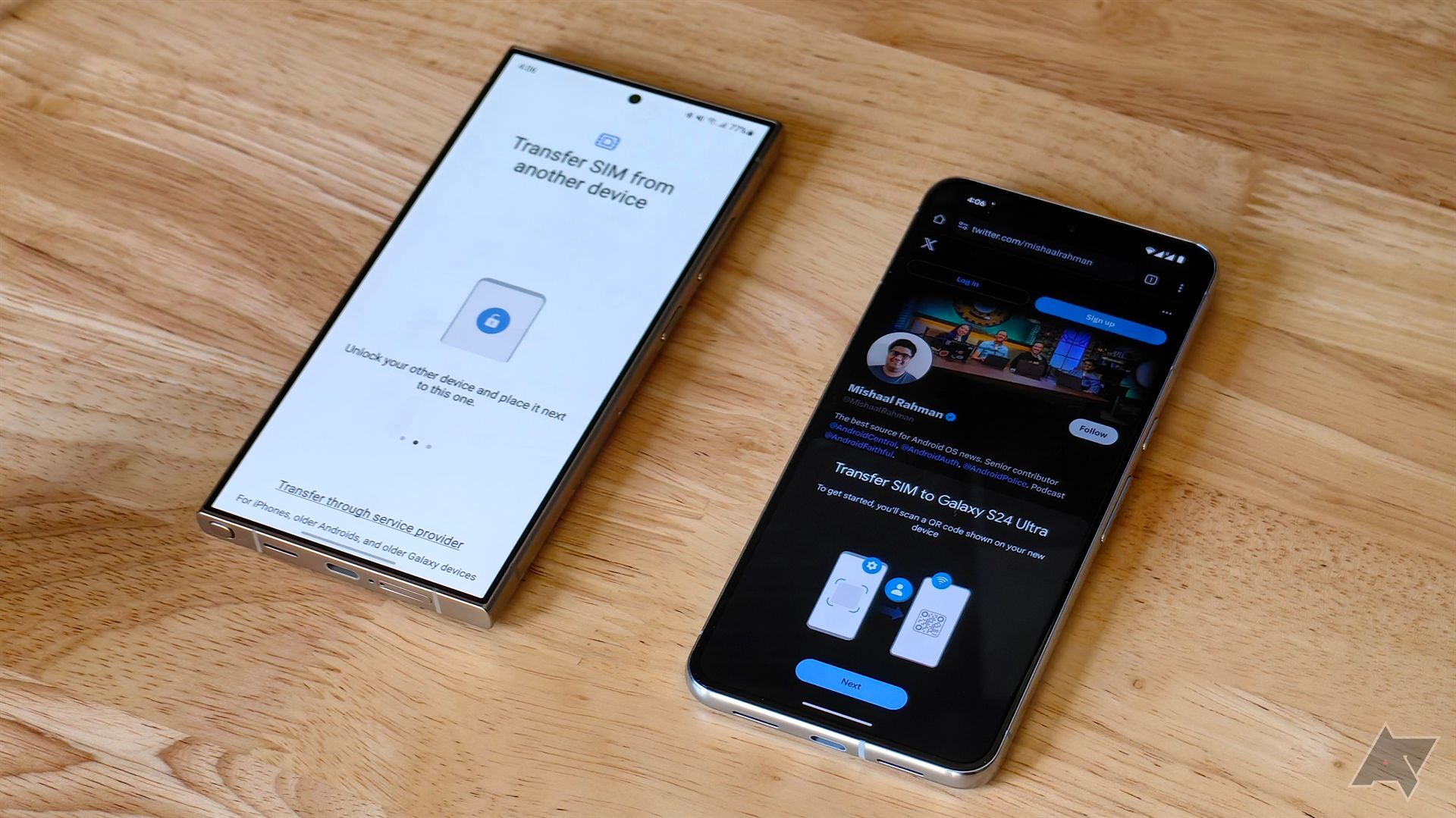I don’t understand how this wasn’t more of a priority to begin with. If you’re going to offer a digital solution for something it should at least be as convenient as the existing physical solution.
Hah. To swap eSIM on O2 in the UK, you have to order a physical pack that gets posted to you with the QR code in. There is no way to get the code to appear on a screen you can scan with your camera, or in an app on the phone you can transfer to the phone’s eSIM manager. It’s so dumb.
That’s so dumb. When I moved over to Google Fi, I put the sim in, the phone ported the number, then I chucked the sim into the fucking trash. Whenever I get a new phone, I just need to sign in on wifi and Google does the rest.
Granted – I only use phones designed to work on Fi [Nexus/Pixels], but I prefer vanilla Android.
Same here. Seems like Google did a pretty good job with the eSIM registration in their app. I’ve swapped phones a number of times with zero issues.
That is very dumb with Verizon in the US you just type in the esim imei online and submit it and it auto downloads and activates the esim on your phone very easy.
This is just an assumption, but I thought the whole point was to make it more difficult for people to switch carriers?
Also because it’s locking another aspect of the device behind software that you do not have control over, which gives carriers and phone manufacturers some new levers to exact control over how and what you do.
Because evidently we haven’t learned our lesson yet.
Like when the SD card slots got taken away, and now not only are most phones storage non-expandable, you can’t even use a proper file explorer on Android anymore.
Uh, I assumed that was a minimum viable product requirement.
I’ve been avoiding eSIMs like a Boomer avoids anything tech because I don’t understand them, and now I’m glad I did.
SIM cards work fine; other than waste reduction, what’s the point of eSIM?
I still prefer a physical SIM for my main cell plan, but when travelling to other countries it is so amazing to be able to just download an eSIM and avoid roaming fees. Airalo is quite convenient, but I hear it’s getting pricey compared to other options.
Plus with dual SIM I can disable roaming on my main SIM but still receive texts for free, but use data for cheap with the local eSIM at the same time.
Disclaimer: I live in Canada which has some of the most expensive cell plans in the world. Roaming in the US is $13 CAD/day and $16 CAD/day in the rest of the world. That seems like blatant extortion to me, they can’t blame Canada’s large size for expensive roaming fees (right?). I think US plans are a lot better, and I assume European cell plans are generally even cheaper.
Edit: I prefer physical SIMs for my main plan because if my main phone is dead or broken, I can just pop the physical SIM in an old phone that I bring while travelling. Until eSIMs can be somehow transferred like that, I don’t see myself using them for my main cell plan. Just remember to set a SIM PIN so that if someone steals your phone, they can’t use your SIM card to receive 2FA texts.
Edit 2: eSIMs are generally a pain to transfer between phones. I think my cell provider lets you do it online by scanning a QR code, but I know some make you call them and read 16 digit codes over the phone. Some even charge a small fee. I dread the day where other cell phone manufacturers follow what Apple did in the US (I think?) and make eSIMs the only option.
Well, on the other hand, do you just understand how simple cards work? I for sure don’t and I don’t see why I would need a chip from my provider to access it’s services, if I can get a digital key instead.
I like that I can switch phones with a physical card. IPhone to android still no way.
My understanding of this is that the hardware vendor has a pool eSims that work on their devices. The eSIM “transfer” is actually a new eSIM from the carrier’s pool and their simply transfer the emei over to the new eSIM so there shouldn’t be a reason these cannot be transferred between iPhone and Android other than service providers needing to support it.
Your provider won’t issue a new eSIM?
How do you get that to your new phone?
They can and probably already do charge extra for that service.
As I understand it (I’ve done literally zero research), it’s to prevent spam/spoofing, at least in the US. With a physical card, you can’t just instantly convert your phone to a different number and carrier. Now, with all the robocalls I get, there’s obviously still more work to be done…
Spoofing what? Imei numbers? Phone number spoofing is not solved by this. With VOIP you can literally tell it to send whatever number you want to be its caller I’d.
Not that simple type of spoofing. The kind where I could set up a phone with your number on your network that the network thinks is yours and then intercept your incoming calls and text messages. Including being able to get your security texts to verify who you are when I would change your passwords, emails, banking info, stock accounts, etc.
I could see security being one but the only reason that I got one is lack of dual sim tray on my pixel
Okay, now do it when the phone is broken.
The hard way I see.
physical sims can be swapped regardless of OS or whatever arbitrary limitation they impose on us.
i still dont get why esims are a thing besides imposing more control over us
When I traveled across the world last year it took me 5 minutes to sign up for a temporary cell plan in the country I was visiting, then install the eSIM from my phone’s web browser. I didn’t have to plan ahead and wait for them to mail me a SIM card so I could juggle around SIMs while abroad. I much prefer that over a physical SIM card.
im glad you had a good experience in the random country you were in.
but have you ever dealt with most carriers? also who waits for sim cards in the mail instead of just buying one?
For reference, this was in Japan. From my experience, there weren’t SIM card vendors until you get through customs. That could be a 2 hour long process from landing to entering the country before you can get a SIM and communicate with family or your travel arrangements at your destination. It also won’t be doing you any favors if you need to pull up documentation on your phone to provide to the customs agent, like your return ticket.
I can buy an eSIM and install it before leaving my home and verify it works instantly. It’s just a better experience than the alternative.
also who waits for sim cards in the mail instead of just buying one?
Cellphone carriers that have no brick and mortar? But are also significantly cheaper for basically the same service
I just bought up a few prepaids and popped them into my phone when I wanted to use them. Also we shared them between people. Not sure how sharing works on eSIMs
Maybe in somewhere free like the EU or SEA. In the US, most phones bought from a carrier (and most sales are that way, some exclusively so) are locked so that no other SIM (e or physical) can be used.
That’s your problem as a consumer accepting that. This thread makes me depressed, with the amount of people happy to allow shitty US consumer hostile practices to become more common globally.
Cell phone use was a US thing that spread there before any other country. Five fold the amount of mobile phone users than the next closest country. They were also invented in the US.
The way of buying a cell phone and paying too much for the monthly pan, but getting the phone for free kicked off in the 90s and has never managed to go away because yeah, the cell companies are assholes, but also because consumers got used to getting phones this way. The bs part is that you plan isn’t any cheaper, even if you own your phone outright.
But for most people in the US there’s little use for switching carriers while using your same phone, so sim stuff isn’t all that important. Most don’t vacation outside of the country.
as a consumer accepting that
That’s the special condition we get in the US, though - there is little or no effective choice across the spectrum. Without regulation, corporations will become asymptotic to maximum financial extraction techniques. There are few real choices at the consumer level and the barriers to entry are such that a single consumer - or even an uncoordinated (read: without a national, staffed organization) - cannot circumvent the system.
It’s just to give more control to the carriers. They say it’s a feature for travel but realistically how many people and how many countries does that actually apply to? Some places require ID to buy a SIM card, many places don’t even offer plans travelers would want to use (who wants to pay $80 for 1 month of unlimited data instead of $5 for 1GB for a week?), and there’s also the question of how many travelers are there vs locals? Are the travelers the majority of users? The majority of profit? Why don’t the travelers’ local phone companies have travel plans to gouge the travelers themselves?
Anyway all this is to say this is just carrier lock in, it’s the return of CDMA.
deleted by creator
Maybe it’s just bad luck, but the last time I tried to swap a physical SIM, I inserted the removal tool in the hole, and then the mechanism somehow broke. So I cannot swap my SIM from my current phone to any other phone, unless I have eSim. Unfortunately, my current phone does not have eSim.
How do these eSIMs work from a user’s perspective? I’ve only ever had phones with physical sim slots
Effectively, imagine there’s a SIM card soldered to the motherboard of the phone, you can then download an eSIM to it and the phone behaves as if it’s a physical SIM.
In reality it’s generally built into the modem and I believe they can typically hold multiple eSIMs. What I’m not clear on is if inactive eSIMs actually live in the hardware eSIM or if they get swapped in by the OS
Depends on the phone. The newest ones let you use multiple ones simultaneously, one for calls/texts and one for data, for example. Slightly older ones only let you use one at a time, but they let you activate and deactivate multiple downloaded eSIMs.
on T-Mobile USA: I preordered my iPhone 15; the QR eSIM and automated SIM transfer system was completely down and I had to spend 30 minutes to an hour on the phone with customer service to swap over my physical SIM to an eSIM I could type (IIRC) into my new phone.
How frustrating
Yeah same, I want to know how you move phones if one breaks, or any number of similar situations where you can’t run an app or access another device
That’s my big concern as well.
With Google Fi you just sign into the fi app and transfer the phone. You need wifi but that’s it.
Yeah, I’ve been using Fi for more than 5 years and haven’t needed to worry about sim cards in a really long time.
The process with esims is so easy.
Its a shitty replacement. If I couldnswap phones like a sim card i wouldn’t care. But they charge for a phone swap no thanks.
You call support and have them issue a new one.
Don’t you need a SIM for calling?
I’m not sure if there’s some special calling feature to reach a previously associated provider, but when I’ve been in that situation I just borrowed my roommate’s phone.
yea, that’s my biggest annoyance with it, if you can’t pass security on the phone (talking to you prepaid carriers who have absolutely shit CS and protocols) you can no longer just hot swap the sim to get your verification code. You are just locked out of your account now. It’s nice that it’s more secure but, also such a pain in the ass for people who don’t call their carrier a lot so they don’t know their security.
As in ring the network (presumably on a third, working phone) and wait for them to post you something? Doesn’t sound like a great user experience!
No, they issue it virtually. Then you download it via their app or via regular cell network provisioning.
download it via their app
On the phone that isn’t connecting to the internet, because it doen’t have a SIM yet? Or do eSIM phones use free internet before they have an eSIM issued?
In the store if you’re getting the phone from a store, or somewhere with wifi (home, a friend’s, a cafe) if you’ve gotten it some other way.
If you don’t have any of those, you probably live way out in the jungle, and I’d be surprised if you had service even if you got the eSIM. But in the edge case that you somehow got home delivery postal service in the jungle, you’d probably be able to survive just fine without it until your next trip into town.
In the extreme edge case that you are in the jungle, get service, and your need is critical, I would have an activated backup phone tested periodically and ready to go.
Exactly the same as a normal one. It just works and you don’t really need to do anything with it. Everything seems the same just no little card in the side of your device.
Until this article I thought you could swap eSIMs between phones, exactly like normal ones
Tbh I think you effectively could, but it would technically be your provider issuing a new one.
For me I just log into my provider’s online account screen and I’m able to scan a new QR code
Eh that’s not really the same. And reading this thread it seems many providers (including mine) don’t support online QR codes.
That’s unfortunate, at least in the UK all the (eSIM supporting) providers seem to offer the same capability.
As I’ve said elsewhere a physical SIM is slightly better in the situation where you smash your phone and buy a new one as you don’t need to connect your new phone to the phone shop’s WiFi for 5 mins (scanning the QR code is the quick way, you can just type an alphanumeric code in too, some carriers let you download it via an app). On the flip side though, if your phone is stolen, I still just need the WiFi for 5 mins. With a physical SIM, it would be sent to my home address and arrive a couple of days later.
Yah and mine charges for a phone transfer. No thanks I’ll keep physical sim as long as in can.
Well frankly, that’s pretty shitty of your carrier, IMO. I didn’t realise anyone was actually out there charging for what’s basically essential functionality.
There’s basically nothing technically different about transfering a physical SIM or an eSIM from the network’s perspective. The same registration takes place, they have to send all the same carrier service configuration messages.
I don’t blame you at all for holding onto a physical SIM in that scenario, but I’d be looking to move to a less customer-hostile carrier once my contract was up.
Well frankly, that’s pretty shitty of your ______, IMO. I didn’t realise anyone was actually out there charging for what’s basically essential functionality.
I just wanted to say how valuable this lesson is for everyone who hasnt learned it yet to learn
This is an equally important lesson to learn for both capitalism and enshitification.
Find or create a need and exploit it
I thought you could too but I use Google Fi and I just log into my Google account on a new device and it lets me deactivate the old phone and download the sim to the new phone.
What if I need to change the SIM?
You get a QR code for the new sim, go into the eSIM manager on the phone, and scan it
I don’t want a “new sim”, I want my old one, which doesn’t exist anymore since it was virtual and only existed in my now broken previous phone. How does it work in that situation?
Call your carrier or go into a store and they move it over. If your phone is broken you’ll kinda be SOL since there’s no way to authenticate the move.
Exactly. What a shitty anti-feature. Your answer proves that the people saying that “eSIMs are functionally the same as normal SIM” are full of absolute shit.
Genuinely asking, what do you gain by transferring the physical Sim?
Call your carrier
Without a SIM?
@AdmiralShat @FragmentedChicken phones that support esims have actual sim chips inside, and esims basically flash the carrier data onto that chip.
They’re functionally the same as normal SIM, instead it is stored in a secure location of the storage (which can survive factory reset). In a way, it makes it a bit more secure as a thief can’t just yank out the SIM card to avoid being tracked (although it doesn’t defeat a faraday bag) or take it out to use it in another phone.
The major function of a normal SIM is the ability to take it out of one device and put it into another one, effectively disconnecting my identity towards the network provider, from the handset. With eSIM, that doesn’t exist, and if my phone breaks, it’s unclear what happens.
To me, that’s not secure, that’s unsafe and insecure.
From a corporate device perspective it’s an interesting evolution though, since we can remotely provision an eSIM through our mobile device management platform. No SIM to handle from the user point of view, and they can’t take it out.
that doesn’t exist
Well fwiw, the post we’re commenting on is about that now existing.
the ability to take it out of one device and put it into another one, effectively disconnecting my identity towards the network provider, from the handset
Unless you think that taking a SIM out of a phone means that the phone is no longer connected to you, which isn’t the case at all. A phone’s IMEI is sent along with the SIM data as part of the initial handshake to make a mobile connection, your carrier knows the make, model and serial number of every phone you’ve ever put your SIM card in. The police in most countries make them keep track of which cell towers that combo of IMEI and SIM connect to and at what times. There’s no privacy in using a mobile network you pay a bill for.
that’s not secure
Obviously this isn’t the be all and end all of security, but an eSIM slightly improves device security because a thief would be unable to remove it and disable any theft tracking measures which require network access. (Yes I know about EM shielded bags, but most thieves are opportunists)
The only real advantage of a physical SIM is that if you smash your phone up, you can walk into a shop and put it into a new phone without needing an internet connection first. If I smash my phone up, I need a WiFi network to hook my new phone up to the network. On the flip side, if I get robbed abroad, the process is the same. With a physical SIM it’s gonna get sent to my home address.
So can I move my sim to an iPhone? Or a non google android?
It seems to support transfer between Google and Samsung devices on the latest OS according to the article.
Given that, if it doesn’t work with non-google/non-samsung devices today, I’d expect it to in the future as that’s obviously the goal for this.
Funnily enough about iPhones, I don’t think they even have a physical SIM slot anymore in some markets. So unless they have a transfer feature I’m unaware of, you’re gonna spend a minute logging into your network’s account screen and scan a new QR code, like you can with any eSIM phone today.
The same way Verizon phones used to work: less well.
Exactly back to phones working on only one carrier. I know not yet but give it awhile.
When I got my Pixel 8 Pro it asked me if I want to convert the physical SIM from my Xiaomi 9 SE (and disable the old SIM). I didn’t have to take off the case and move the SIM, so I liked it.
With Google Fi
Yep, same here. Wouldn’t want to use eSIMs at all if they were any more hassle than this. But their process to me is good enough to outweigh the physical SIM swapping process.
Generally you go to some site your carrier has, enter the IMEI or some number from your phone’s settings, then scan a QR code. It’s not bad… depending on your carrier.
And pay a fee.
This thread made me wonder how often y’all change phones. It sounds like four times a day.
No. Once every few years. However, the gap in service is absolute disaster in modern society. Without a phone, you can’t use public transport, can’t pay for parking, can’t get a taxi/uber/competitor, etc. etc.
Any “progress” that makes the turnaround time longer when your phone breaks is a horrible and unacceptable downside.
For me it’s about every 1 to 2 years, but I’m an app developer part-time so I use it to make money which justifies the high cost of ownership. I keep the trail of older phones for testing on different models.
For my wife, it’s more like 4 years, and we prefer to get last year’s model especially with today’s update commitments.
Nice. That is always the most tedious and annoying part of switching phones every single time for me.
*Google
but some carriers don’t
I tried to transfer my eSIM from my old S21 to my new S24 the other day. It failed miserably. My carrier charges me $10 for a new eSIM (which i think is way too much for a digital service). Transferring eSIMs sounds like a good idea if it works, but might not be endorsed by carriers that earn large profits from the service.
The $10 is so ridiculous not because it costs them virtually nothing as a digital service, but because they charge you for access to something you’re already paying them for.
I agree. Because of this, I actually changed carrier to one that was cheaper, had better coverage and free eSIM.
Looking for a new, non-shot phone. Can anyone ID the one on the left?
It’s the Samsung Galaxy S24 Ultra. Apart from the flat bezels, you can see that the other phone reads “Transfer SIM to Galaxy S24 Ultra”
Thank you, good detective work
With the edges and the s pen I would guess it’s the S23 Ultra maybe the Ultra the year before.
Brilliant, thank you



















